Search Results for: salsa
Bebo Valdés is considered one of the central figures of the golden age of Cuban music
On March 22, 2013 in Stockholm, Sweden, Dionisio Ramón Emilio Valdés Amaro, better known as Bebo Valdés, died.
He was an excellent musician of Cuban music and Afro-Cuban jazz, considered one of the central figures of the golden age of Cuban music.
In addition to being a pianist, his best known facet, he has been a composer, arranger and orchestra conductor.
He was born in Quivicán, Cuba, on October 9, 1918. He was the father of the Afro-Cuban jazz pianist Chucho Valdés (b. 1941). From 1931 to 1935 he studied piano in his hometown with Moraima González; in 1936 he moved with his family to Havana, where he studied music theory, harmony and composition with Oscar Bofartigue.
In 1938 he made his professional debut with Happy D’Ulacia’s orchestra. He played in Havana, since the 1940s, in the orchestras Ulacia, García Curbelo, Julio Cueva and Orquesta Tropicana, and recorded albums with groups dedicated to performing Afro-Cuban jazz.2
Known among his family and friends by the affectionate nickname of Caballón because of his considerable stature, he composed mambos, such as La rareza del siglo, which covers the genre recently introduced by Pérez Prado and which would change the course of Cuban music. From 1948 until 1957, he worked at the Tropicana cabaret as pianist and arranger for Rita Montaner.
The Sabor de Cuba orchestra, of Bebo Valdés, and that of Armando Romeu, made the show of this night club, in which Valdés stopped performing in 1957, when he was hired by Ernesto Roca, of the Peer International Music Publishers, to make arrangements for Xiomara Alfaro and Pío Leyva; at the same time, he joined Guillermo Álvarez Guedez, of the Panart and Rolando Laserie in Radio Progreso. With his orchestra Sabor de Cuba, he accompanied singers Reinaldo Henríquez, Orlando Guerra (Cascarita), Pío Leyva and Ada Rex; Beny Moré also sang with this group, and Chucho Valdés made his debut.
About the descarga or jam session, there are multiple versions, this is the one by Bebo Valdés which, due to the concreteness of data, dates and record labels that made the recordings, is the most objective: “One night in October 1952, I was resting in a cabaret in Havana with members of the Tropicana orchestra.

It is important to know that since 1948, Cuban, Mexican or even American musicians used to meet on Sunday afternoons at the Tropicana to play descarga, in the course of which we mixed jazz and Cuban rhythms.
Sometimes the descargas were held at four o’clock in the morning, at the end of the [Tropicana] show. The percussionist Guillermo Barreto was the one who animated them; we had received Roy Haynes, Kenny Drew, Sarah Vaughan, Richard Davis and many other musicians passing through; in fact, all the great names of jazz paraded through the Tropicana.
All of that could have been recorded, but no one was interested. So, that night Irving Price, the owner of a record store on Galiano Street, announces to me that producer Norman Granz is in town and that he can’t believe that Cuban musicians are capable of playing jazz.
Granz and Price ask me to go to the studio to record. It was September 16, 1952. So, I called some musicians, but I myself was late for the session, because in the morning I had another recording for RCA: I was going to accompany a singer! When I finally arrived at Panart’s studio, Granz had already left for the United States.
We called the orchestra The Andre’s All Star, after the name of Irving Price’s record store. We had decided to play classic jazz tunes, such as Distrust, Taboo, Sleep and Blues for Andre. At the end of the session, as there were still a few minutes available for the record, I started playing a riff, from which we improvised. We called that track “Con poco coco.”
The record was titled Cubano! and the participating musicians were all from the Tropicana cabaret: Gustavo Más, tenor saxophone; Alejandro Vivar (El Negro Vivar), trumpet; Kiki Hernández, double bass; Guillermo Barreto, timbal; Rolando Alfonso, tumbadora and Bebo Valdés, piano.
The works it contains are the same as those mentioned by Bebo Valdés, and the label, Mercury. In 1955, Bebo Valdés recorded, in the studios of Radio Progreso, Holiday Habana and She Adores the Latin Type, for the Decca label, which contained mambo, chachachá, bolero, jazz descarga, even jazz with bebop tendencies.
According to Luc Delannoy, in 1956 the Panart recorded Cuban Jam Session, with Julio Gutiérrez and Pedro Jústiz (Peruchín), as directors, and the musicians Alejandro Vivar (El Negro Vivar), Edilberto Escrich, Osvaldo Urrutia (Mosquifin), Emilio Peñalver, José Silva (CHombo), Juan Pablo Miranda, Salvador Vivar, Jesús Esquijarrosa (Chucho), Oscar Valdés, father, Marcelino Valdés, Walfredo de los Reyes and José Antonio Méndez. The participation of Israel López (Cachao) in a descarga did not occur until 1957, when the Panart recorded Descargas cubanas, with the participation of Cachao himself, Guillermo Barreto, Gustavo Tamayo, Rogelio Iglesias, Richard Egües, Andrés Hechavarría (El Niño Rivera), Rolito Pérez, Alfredo León, Arístides Soto (Tata Güines), Alejandro Vivar (El Negro Vivar), Generoso Jiménez, Orestes López (Macho), Emilio Peñalver and Virgilio Vixama. In other years, there were also recordings of downloads, and some unrecorded ones, such as those recalled by Leonardo Acosta at the Cuban Jazz Club, held between 1958 and 1960, with the participation of Pedro Jústiz (Peruchín), piano; Guillermo Barreto, drums and pailas, and Arístides Soto (Tata Güines), tumbadora (drums). This proves -or at least shows another side of the coin- that Bebo Valdés was one of the initiators of descarga in Cuba, a resource used by Cuban musicians in the most diverse instrumental formats, genres and styles of our popular music, as, for example, did the composers of the filin movement.
On June 8, 1952, with a band of twenty musicians, Bebo unveiled the batanga rhythm in the studios of RHC Cadena Azul; among the three singers in the orchestra was Beny Moré.

That same year he travels to Mexico with the purpose of recording a disc with this new modality of Cuban music, which also included a new choreography; they were not successful, and, according to Bebo Valdés, “the batanga died a natural death”.
When he left Cuba in 1960 due to disagreements with the Cuban government, Bebo also abandoned his family, his wife Pilar Valdés and his five children (including Chucho). Bebo Valdés goes to Mexico, then moves to Los Angeles, California, where he works with singer Miguelito Valdés; from there he travels to Spain, where he records two albums as director of the orchestra that accompanies Chilean singer Lucho Gatica.
Later he toured England, France, Holland, Germany and Finland with the Lecuona Cuban Boys. In 1963 he settled in Sweden, and worked with the Hatuey Orchestra, a Swedish group playing Cuban music. In Sweden he formed a new family when he married in 1963.
International career
After thirty years of relative anonymity, on November 25, 1994, Valdés received a call from Paquito D’Rivera, who invited him to record a new album in Germany for the Messidor label. A new beginning in his career took place at the age of 76 with the recording of Bebo Rides Again.
He participated in Fernando Trueba’s film Calle 54, along with, among others, pianist and composer Chucho Valdés, Paquito D’Rivera, Elaine Elías, Chano Domínguez, Jerry González, Michel Camilo, Leandro J. Barbieri (Gato Barbieri), Ernesto Antonio Puente (Tito Puente), Arturo O’Farrill (Chico), Israel López (Cachao), Orlando Ríos (Puntilla) and Carlos Valdés (Patato).
In 2004 he traveled to Salvador de Bahia, Brazil, to participate in Trueba’s film El milagro de Candeal, along with Carlinhos Brown, Marisa Monte, Mateus Aleluia and César Mendez.

An integral musician capable of tackling the most diverse genres and styles of music, not only as a pianist and composer, but also as an orchestrator and orchestra conductor of sublime values; of solid technical training, both theoretical and pianistic, Bebo Valdés is one of the all-time greats of Cuban music. He was, with Israel López (Cachao) and Patato Valdés, nominated for the Latin Grammy Award for El arte del sabor, best traditional tropical album 2002.
In 2002, Fernando Trueba produced Lágrimas negras, an album that unites flamenco singer Diego el Cigala with Bebo Valdés on piano.
After its release in 2003, it became an international success, recognized with a Grammy, three Music Awards, an Ondas Award, five Amigo Awards, three Platinum Discs in Spain and one each in Argentina, Mexico and Venezuela. The New York Times praised the album as Best Latin Music Album of the Year and opened the doors to a tour of Paris, New York, London, Havana, Buenos Aires, Tokyo, Mexico City, Madrid and Barcelona, among others. By the end of 2004 the album had sold more than 700,000 copies worldwide.
He retired to Benalmádena, a village in the province of Málaga (Spain), until his death in Stockholm (Sweden).
Read also: Carlos “Patato” Valdés one of the best percussionists in the history of Latin Jazz
Henry Benavides surprises with “Por Cuenta Propia,” his new project
Henry Benavides, arranger, composer, pianist and producer of tropical music with emphasis on Salsa, was born in Barrancabermeja, Santander, Colombia.
In York, NY March 31, 2023 ‘Por Cuenta Propia’ is the name of Henry Benavides’ new project, with which he wishes to elevate his musical career. The Colombian composer, pianist, arranger, and producer of tropical music pays homage to great artists of the industry with his new album.
“The production is inspired by the great salseros who influenced my musical beginnings, such as Richie Ray and Papo Lucca.
The songs I chose marked my childhood, and in my new album I seek to give it a modern and different touch with my arrangements,” shares Benavides.

It is worth noting that the album is musically diverse. Despite being known for revolutionizing the tropical industry, Benavides shows us that even playing boleros, he is capable of transforming and creating new stories.
‘Por Cuenta Propia’ will be available through all digital platforms starting April 21, 2023, and you can already pre-order it through Spotify.
This project symbolizes the convergence of past stories and new rhythms. At the same time, Benavides is preparing for his upcoming Latin American tour this summer.
About Henry Benavides
“Henry Benavides is a Colombian tropical music composer, pianist, arranger and producer whose focus is on modernizing great salsa songs and giving them a new style. Benavides has had the opportunity to work with the ‘Discos Fuentes’ record label in Medellin, Colombia, where he collaborated with internationally recognized artists. As a member of the new generation, his mission is to modernize the salsa genre and share with his style, a new way of making salsa”.

Henry Benavides, arranger, composer, pianist and producer of tropical music with emphasis on Salsa, was born in Barrancabermeja, Santander.
He inherited from his grandparents the taste for music, at the age of 12 he began to play the drums induced by his father.
He graduated as a high school graduate from the industrial technical institute in the year 2000, and by then he already had clear what would be his life project, to live for music.
He decided to travel in 2002 to Pamplona, Norte de Santander, where he settled and enrolled in the university of this same city in the Faculty of Music to formalize his musical studies.
Shortly after entering the school he stood out among his classmates for his great talent. He was a member of the Big Band Oriol Rangel of this institution, being in his seventh semester, his teachers tell him that the knowledge he has acquired so far is the necessary, and that he really has nothing to do there, with the great talent he has, and they suggest him to go out to the arena! What prompted this Barranqueño to undertake his audacity in 2005 and decided to seek opportunities in the city of Medellin.
There he began working with Jhon Jairo Betancur making tracks and karaokes of salsa, merengues, ballads and vallenato, for Discos Fuentes recording pianos and then produced them, being in charge of everything for 2 and a half years, time that was enough to make known his talent which gave him the opportunity to work with the master Alberto Barros in the musical direction of the tribute to the Colombian salsa, and zone three, and to make a production for Panamanian singer Gabi Gabi Gabi.
production for the Panamanian singer Gabino Pampini, Sonora Carruseles, among others.
In 2009, he was invited to record in the city of Cali, an opportunity that he did not miss to seek new alternatives in his career and decided to seek the maestro Alexis Lozano, director of the orchestra Guayacán, to show him his work done during all these years.
He was lucky enough to meet him, and show his talent, which led to an exchange of knowledge and great musical connection between the two and immediately Alexis made it concrete and proposed him to produce music immediately.

In 2012 he directs and produces for Sony music in Mexico, the DVD “La Salsa de los Grandes”, a tribute to the Fania All Stars, with the participation of the best singers and musicians of the world salsa. Considered this work as the most representative of his career for having obtained GOLD and PLATINUM DISC, becoming the only Santandereano to obtain historically this recognition.
In addition to this, he was the author, composer and producer of songs such as YO SOY BARRANQUEÑO, where he pays tribute to his hometown, and EL HINCHA NÚMERO UNO, a song dedicated to his alma team, Alianza Petrolera.
She currently has a music production company, where she makes local, national and international productions, and at the same time has formed her orchestra, with musicians representative of her city, with which she has had the honor of being the only one to accompany an international artist, this being another historic achievement.
In this year 2020 he will launch his new production, entitled “Mi Vida”, which contains 10 unpublished songs of composition, arrangement and production, a dream that began 10 years ago and will close a very important cycle in the life of this young and talented artist.
Among other projects, he is the Musical Director of #salsagang, a project to promote new talents that is currently focused on the Mexican market, as it is one of the most important places for tropical music.
Henry Benavides through his extensive experience and professionalism, has positioned himself as one of the best salsa musicians and producers in the country.
All the productions mentioned above, can be found on the web and social networks.
Contact us:
Yoly Terán
610.348.9700
Read also: Salsa at Hacienda El Paraíso with Los Lebron Brothers Orchestra
Meet Richard “Saoco” Rodríguez
Latin America / Venezuela / Caracas
Venezuelan Richard “Saoco” Rodríguez
There is a great variety of countries in Latin America that are incredible, but none as varied, dynamic and beautiful as Venezuela, a country that is known for having beautiful and varied landscapes, a great variety of climates and fauna, and Venezuelans are very pleasant, respectful and mostly partygoers. On this occasion we have the pleasure of meeting the young salsa singer, Richard “Saoco” Rodríguez who sees the light in the city of Guarenas, the neighboring town of the great city of Caracas, Venezuela.

Since he was very young, he has stood out as a vocalist in local salsa genre groups, he was driven by recommendations from family and friends, he decided to compose his own songs and make contact with two great and renowned musical arrangers such as José “Tuky” Torres and Héctor “Chispa Hurtado, the latter is the one who takes the reins as music producer and arranger of his orchestra.
Richard “Saoco” Rodríguez has the ability to compose songs in a very contagious way, he takes up the essence of Son, Mambo and Guaguancó.
He has received 4 important awards from the Music Industry such as the Popular Vote of the Singing Festival at the Teatro Principal in 2016, the Compas de Oro Award for International Salsa in 2017, Salsa Revelation Figure of the Year in 2017, Yara Awards The Best Salsa Singer with International Projection in 2018.
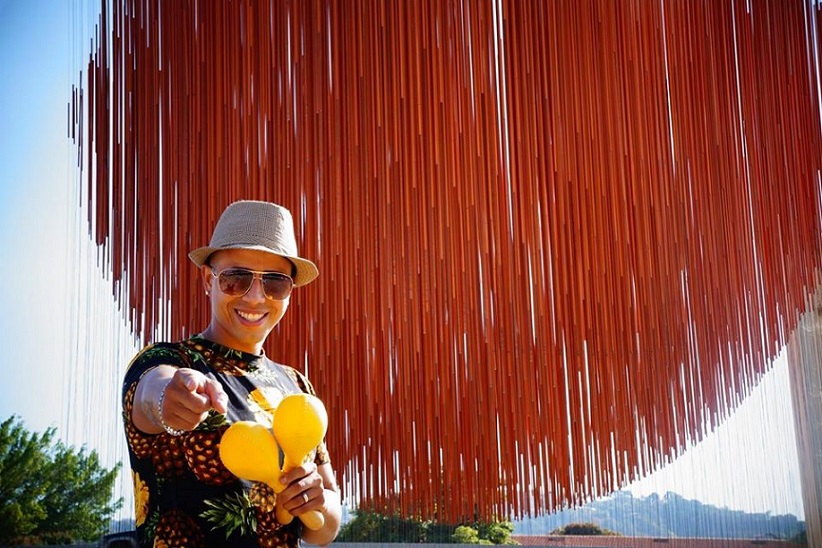
Today he presents a musical proposal with the launch of his new song titled “Soon you will return”, where he incorporates the Harp which is an emblematic instrument of Venezuela that resounds in the musical sound that maestro Héctor “Chispa” Hurtado gives it.
Consequently, Richard gets emotional when he tells us about this song, telling us that it all started one day watching the planes leave the Simón Bolívar Airport.
“I went to accompany a great friend who was going to Argentina and on the way home I thought about how hard it is to leave our land, leave our loved ones to undertake new challenges in another country. When I got home, the muse and nation came up with this beautiful song “Soon You Will Be Back” where I remind my Venezuelan brothers of our customs, the importance of sharing with the family, reminding them that we are a happy, pachanguero country.”
Richard “Saoco” Rodriguez.

Definitely Richard “Saoco” Rodríguez came with his talent, style and originality to be the difference, thus demonstrating that he is part of the relief generation in the Salsa Industry.
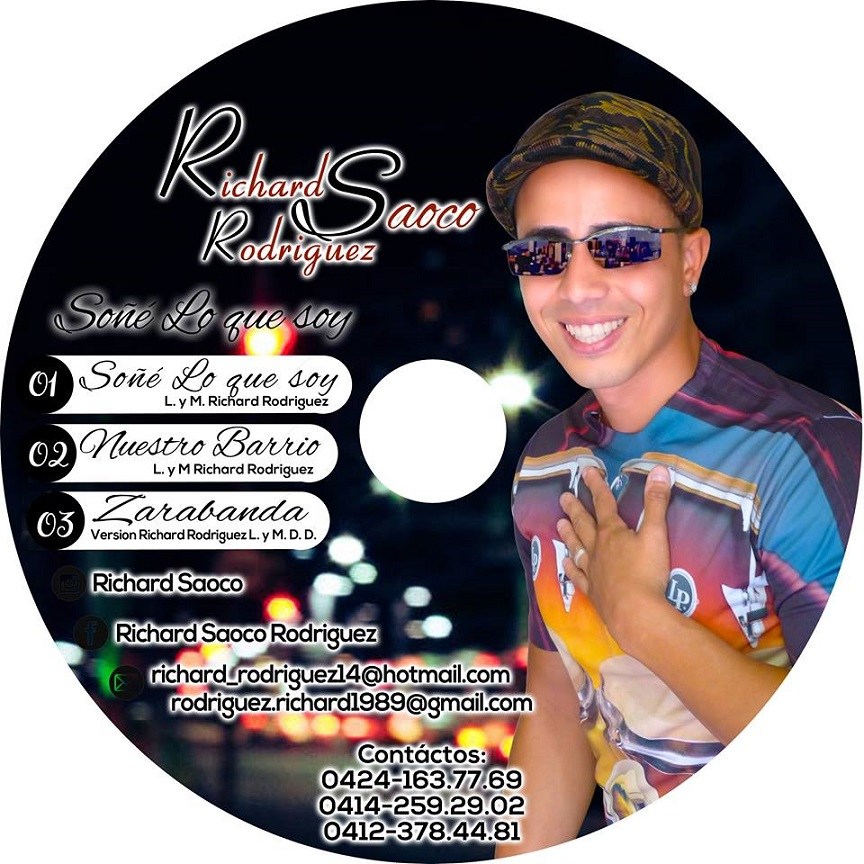
For more information:
You always can count with friends
Latin America / Puerto Rico
I want to congratulate Gilberto Santa Rosa for a great job done with his first Virtual concert “Canta Mundo” to inaugurate the Coca-Cola Music Hall in El Distrito, located near the Puerto Rico Convention Center, in Miramar.
Gilberto offered a magnificent a virtual live concert with his band of Puerto Rican musicians. This is the first time, since the emergency began in Puerto Rico due to the pandemic created by COVID-19, that this modern room was activated to present a live concert recorded live, especially for Rums of Puerto Rico, and that they have chosen such an extraordinary artist for the inauguration was without a doubt a great success.
After much expectation, the Coca Cola Music Hall had its opening in a totally different way than imagined, with a concert that did not have the presence of the public or applause between songs, due to the limitations imposed by the COVID pandemic- 19. Gilberto Santa Rosa was entrusted to offer the first recital in the space. Both the singer and his musicians took all possible security measures to prevent the spread of the disease, but obviously, without the use of masks that would prevent them from playing their instruments or singing.
The concert “Canta Mundo” continues online so that the millions of Gilberto fans throughout the world become intimate audiences in their favorite spaces, you will surely enjoy it. The event was exclusively presented by Rums of Puerto Rico, and can be seen through the social networks of Gilberto Santa Rosa, as well as those of Coca-Cola Music Hall and Rums of Puerto Rico.
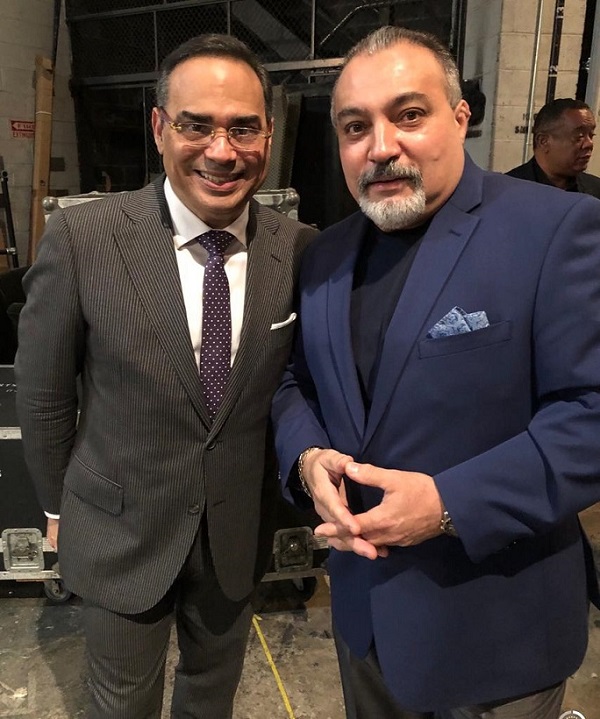
I send a warm greeting to my good friend Jerry Rivas, singer of “El Gran Combo de Puerto Rico” since April 19, 1977, who now shares hits and music with his son Gerardo Rivas. In 1977 Andy Montañez, the lead vocal of the Gran Combo de Puerto Rico, announced his departure from the orchestra. Many saw the group debacle coming. When everyone expected to see an experienced singer, the always-wise director Rafael Ithier found a young singer to suit his group’s style.
The chosen one was a young man of just 21 years: Jerry Rivas. A shy Jerry Rivas presented himself with a cassette recorded with the music of the first groups that he joined for a short time, the musicians of the Gran Combo, looked at him suspiciously. Ithier, with his traditional good humor, contained his musicians with these words: “you rest easy, it is a black painted white”.
On April 19, 1977, Jerry began singing with El Gran Combo de Puerto Rico. Jerry Rivas’ first performance was “Buscando Ambiente” at El Club Caborrojeño de Guaynabo and his first international success was “La Clave y el Bongó”. Rivas, self-taught and who in addition to singing plays guitar, cuatro and cuban tres guitar, remembers that as a young man he was a rocker, but he was struck by the joy that the members of the Gran Combo projected in their dances and choreography.
In his long career with El Gran Combo, Jerry Rivas, has become a renowned sonero and one of the oldest members of the Universidad de la Salsa, has recorded 30 albums with the group and many of the greats were recorded in his voice. hits from the orchestra, such as “Y No Hago Más Na”, “El Menú”, “Azuquita pa’l Café”, “Que me lo Den en Vida”, “Ojitos Chinos”, “Me Liberé”, among many others. The Gran Combo was the key to success for Jerry, who thanks Quique Lucca, founder of Sonora Ponceña, for his recommendation that Ithier give him the opportunity to audition. His talent was passed on to his sons, who became Los Rockolos as children.
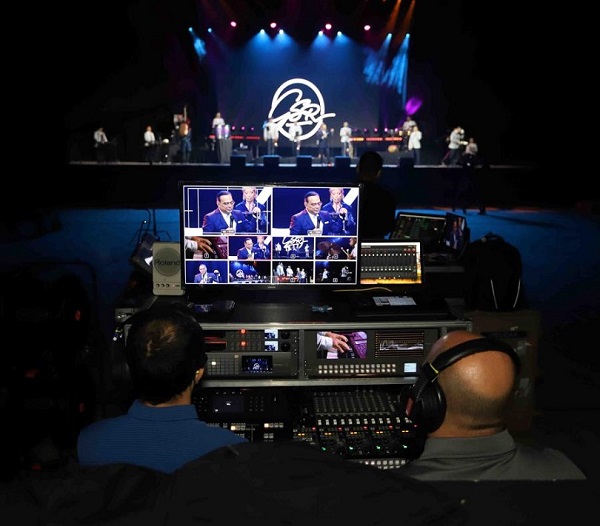
Today, Gerardo begins his solo career, and Jerry Junior together with Samuel conducts the Los Rivas Orchestra organized more than a decade ago. Gerardo always affirms that no matter how many differences they may have, music unites them. He revealed on some occasion that his father did not want him to dedicate his life to popular music due to the strong and unstable environment, the risks and swings of the artistic world.
However, when Jerry looks at them during rehearsals and on stage, he is proud and always advises them to be responsible, avoid the negative and assimilate the positive. Recently, the vocalist of El Gran Combo joined with his son, also singer Gerardo Rivas, and his grandson Gerardo Gabriel to carry a musical message to his followers in the midst of the coronavirus pandemic (Covid-19).
The trio came together to perform a classic by the legendary salsa orchestra, Mente Positiva. “In difficult times, the best we can do is carry a positive message,” wrote Gerardo, also a member of NG2, in his social media. Rivas father was in charge of the Cuban tres guitar, Gerardo Gabriel of the key and the maracas and Rivas son interpreted the theme. It is not the first time that they have joined this quarantine to delight their followers with a musical number.
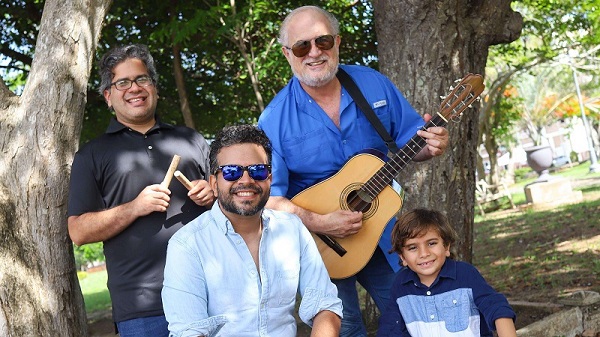
I applaud the initiative of Pedro Oggie García as CEO of Salsa Artist Booking Entertainment Group (SAB), who with his daily work supports all the salseros in the world at SalsaArtistBooking.com. SAB is the company specialized in the digital coding of music, administration, promotion and representation of Artists of the Salsa genre, With an experience of more than 30 years in the media and with relationships worldwide, always characterized by our responsibility, seriousness and compliance.
Using their experience, international relations and positioning, they will make your musical work a success. Always taking care of their interests and rights, trying to take the artists and their music where their public requires it. Contact them +1 956-442-0099
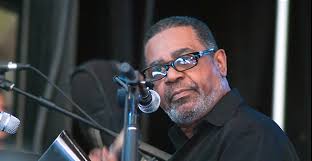
I would like to share with you my admiration for José Mangual Jr. “El Campanero Mayor”, who is an American percussionist, of Puerto Rican origin, son of also percussionist José Mangual Sr. He was born in New York on January 11, 1948 and has a trajectory of almost half a century in Salsa.
His contribution to this genre began in the mid-sixties in his native city, when he joined the group of Monguito Santamaría, son of the great percussionist Ramón “Mongo” Santamaría. He also played with La Conspiración. He was part of Tony Pabón’s band, which marked the beginning of his role as a singer. On the LP “La protesta”, recorded in 1972 for the Rico Records label, José Mangual Jr. sang the song “San Miguel”.
In 1971 he joined the Willie Colón band, and since the singer was Héctor Lavoe, José participated in the best and biggest albums recorded by that great duo. Mangual Jr. also recorded with Rubén Blades on some of the most representative albums in the Panamanian singer’s musical career. His talent has allowed him to be making simultaneous recordings with other groups, musicians and singers, such as Ismael Miranda, Mon Rivera, Frankie Dante, Ismael Quintana, Celia Cruz and the Willard Orchestra, conducted by Willie Pastrana.
In 1977 he launched as a soloist, recording with his own group the album titled Tribute To Chano Pozo, and so far, he has around twenty of his own albums. These are added to almost thirty recordings with Willie Colón, Rubén Blades and Héctor Lavoe. But they are only part of the huge list of his recordings with other orchestras, musicians and singers. His meritorious career has allowed him to travel to many countries of the world alongside countless great musicians and singers, and become an example of dedication and love for music.
This has also allowed him to make friends around the world who admire, love, respect; and be with him in important moments, triumphs, defeats and also in goodbyes … José Mangual Jr. lost his grandson Tyrell Bryant a few weeks ago to the covid-19. I extend my heartfelt words of condolence for such an irreparable loss, and reiterate my unconditional support for the entire family at this difficult time. You are not alone! I dedicate special tribute to his grandson Tyrell Bryant who always be present in our hearts. RIP 04/04/1992 – 04/18/2020.
My friends, I need you know that we continue working hand in hand with prominent artists from New York and Puerto Rico on the CD dedicated to maestro Adalberto Santiago on his 60th Anniversary. I promise to have more details about this fantastic musical production very soon.
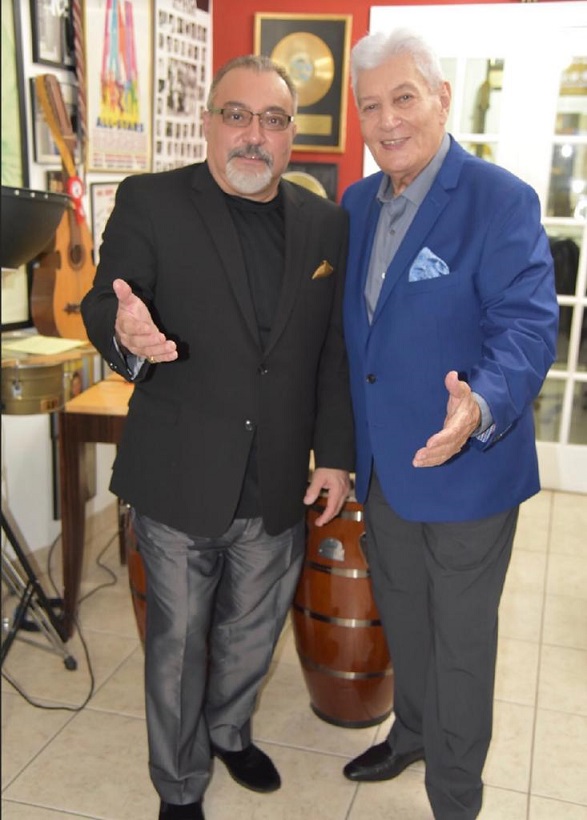
I appreciate the support of Carl Cristiano, L&S Custom Tailors and cKc for my TV Show outfits and my public performances. Tailored suits with total care and confidence. Contact them, I recommend them with pleasure. www.LSTailors.com. Address: 138 E 61st Street Suite 201. New York, NY 10065. Phone: +1 212 752 16 38.
Don’t forget tune in to my new Fm / Internet radio station on Live365.com: Salsagallery. Great music, artist interviews and much more made with love for you all. There is the link: https://live365.com/station/a77973
Although yet It will not be possible to open to the public the Spanish Harlem Salsa Gallery in 1708 Lexington ave New York N.Y. 10029, you can see the entire exhibition with more than 200 articles through our social media. Check the updates in our website: spahasalsagallery.com.

New York City is slowly returning to normal. We hope to be sharing with you physically again, but now we follow the instructions of the authorities to keep us safe and healthy.
Contact: Johnny Cruz. 917-747-8505. [email protected].
 By Johnny Cruz, ISM Correspondent, New York, New York City
By Johnny Cruz, ISM Correspondent, New York, New York City





